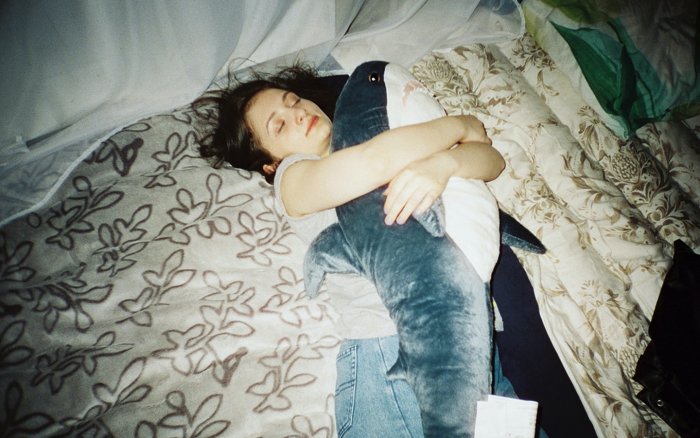*Warning: f-bombs dropped below!
“She got kicked by a horse!”
I remember screaming that, terrified and disoriented, as I ran at full speed toward help.
I was seven, and my parents had left me in the care of relatives while they vacationed. Sent outside to play with my younger cousin, my playmate darted off to the animal pen in the yard, where she was promptly kicked.
I stood with my mouth agape before I took off running for an adult.
I had shards of terror threatening to swallow me whole as I was scolded and yelled at for my apparent ineptitude.
Not only should I be ashamed of myself, I was told, but I also was informed that we would not relay this incident to my parents when they called, lest we ruin their vacation. We were to focus on my science fair project and the optimal success of my bean sprouts.
I obediently stayed silent, cramming my overwhelm inside my little body and burying the incident in a pit in my stomach, now a black hole of overwhelm and discombobulation.
I was seven when I learned that I was not allowed to feel my fucking feelings. I was to focus on the positive, lest I ruin someone else’s good time.
A habit that stuck with me for decades.
Infants are not born with self-soothing skills. Babies have mirror neurons that help us learn how to name, process, and develop resilience for the emotional experiences of our lives based on the attunement of our adult caregivers.
This requires having had a parent who looked us in the eye, sat with us, listened to our experiences, and accepted us for who we are and our perceptions of our life’s happenings.
There are no exceptions to this.
Most of us have developmental trauma from not being witnessed or wholly seen as a child. Our brain development relied on it.
Now, as an adult:
I could feel the irritating bonfire of anger in my chest. The heat was igniting my heart. I compressed it down, so my firey rage didn’t escape out of my mouth or fingertips. Deprived of acknowledgment, the flames grew higher inside me, the heat increasing and my discomfort mounting.
I was about to explode.
Following a string of dates that didn’t progress despite my best efforts, I penned a lengthy Facebook post inside a closed private dating group, expressing my sadness, fear, and loneliness after a series of bad dates.
Inside this group, a positive attitude was the key to certain success; it’s what I liked about it.
We took responsibility; we worked on our inner stuff; we stayed positive, and we never let a bad date or a dumb text annoy us.
For every problem, there was a solution.
For every negative mindset, there was a positive reframe.
For every “I’m about to quit,” there was a “you got this!”
All the stuff I had dutifully learned would save me from my own feelings.
But I was fatigued by constant self-improvement, constant reframing, constant “it only takes one “-ing. I simply wanted my experience to be acknowledged, heard, witnessed, and validated.
Instead, I was given unsolicited advice about “what was I doing wrong.” Many of the replies focused on how I was not “in my feminine” or how I must be “giving away my power” to these men.
My body felt like it was going to burst into flames.
It was the same feeling I had at seven.
Feeling unheard and scolded, I furiously removed my post and vowed to find a better way.
By age seven or eight, most of us had figured out that we would not get attunement from our parents.
Rather than being met with curiosity and space to express the essence of who we were, most of us were provided with the thick, blunting tools of culture intended to help us develop “resilience”:
>> “Suck it up.”
>> “Look on the bright side.”
>> “Get back out there and try again.”
>> “Stop whining.”
>> “Stop crying.”
Most of these instructions were to build foot soldiers of the North American landscape of positivity and productivity.
What we didn’t know was that each of these instructions helped us develop a coping mechanism, a developmental trauma, and a trigger.
We were being taught to win cultural approval and acceptance at the cost of our authenticity.
In our adulthood, we are nearly assaulted with calls to love ourselves, care for ourselves and improve ourselves. The Instagram positivity foot soldiers of erasing our negative experiences and “not ruining someone else’s good time” of our childhood now shouting at us via Facebook and Instagram memes.
We universally agree that we want to be able to do this—that it’s important and developmentally critical for successful adult lives—but how do we know what self-love is when we were never allowed to feel our feelings or express our authentic selves as children?
How do we know what self-care feels like when we may have been loved but were never truly allowed to be witnessed in our childhood, thus erasing our deepest connection to authenticity?
In rushing toward solutions, our brains cry out for what we wanted as children: to be witnessed, heard, and seen.
We want to be accepted for who we are.
And for this, there is exactly one solution: feel our fucking feelings.
What most of us need most is to be heard and held. We need an empathetic abiding witness who will bear witness to our pain.
We need to start by tuning into our bodies.
What do we feel happening in the present moment inside us?
We need to marinate in the feelings and sensations of our bodies—notice what is happening inside the experience of our skin—without escaping or reframing.
We then need to match those body sensations with an emotion, even if it is sadness, anger, jealousy, or disgust. And we need to have the courage to accept these unsavoury, emotional bits with compassion or criticism or an urging toward self-improvement.
Then comes the hardest part:
Can we speak the truth out loud?
We need to sit with another person, know we aren’t alone, and be heard—have our emotions held.
We need to make eye contact with another person and say, “I have a burning in my chest. On the left side.” Their empathetic abiding presence will reassure our nervous system that we are safe—help it rewire and repair.
We need to meet our emotions with curiosity and compassionate questioning: when was the first time we felt this sensation in our body? What does that body part have to say to us, were it allowed to speak?
We need to speak these stories out loud, matching the experiences of our childhood to the sensations and emotions of the present. We need to have the courage to explore what perceptions or triggers are arising along with our bodily sensations and compassionately hold space for our responses.
This is the practice of self-compassion, holding space, being, and seeking an empathetic abiding witness and presence, alone and with another person.
It’s embracing our fucking feelings.
Instead of focusing on the proverbial bean sprouts.


 Share on bsky
Share on bsky





Read 78 comments and reply